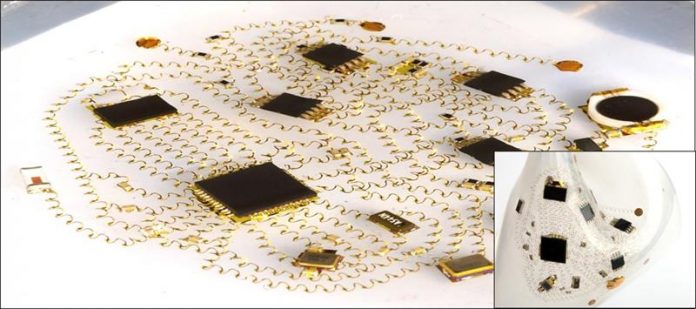An electronic skin microsystem developed by a team from South Korea’s Daegu Gyeongbuk Institute of Science and Technology (DGIST) and Northwestern University can track heart rate, respiration, muscle movement and other health data, and wirelessly transmit it to a smartphone.
The electronic skin is said to offer several improvements over existing trackers, including greater flexibility, smaller size, and the ability to stick the self-adhesive patch to anywhere on the body.
According to the team, the electronic skin contains 50 components connected by a network of 250 tiny wire coils embedded in protective silicone. It wirelessly transmits data on movement and respiration, as well as electrical activity in the heart, muscles, eyes and brain to a smartphone application.
Unlike flat sensors, the tiny wires coils – made of gold, chromium and phosphate – are three-dimensional, which is said to maximise flexibility. The coils and sensor components are also configured in a web pattern that the researchers claim ensures uniform and extreme levels of stretchability and bendability in any direction. It is also said to enable tighter packing of components, minimising size.
The researchers also considered key electrical and mechanical issues, such as sensor placement or wire length, to minimise signal interference and noise.
“Combining big data and artificial intelligence technologies, the wireless biosensors can be developed into an entire medical system which allows portable access to collection, storage, and analysis of health signals and information,” said DGIST Professor Kyung-In Jang.
The researchers believe the micro system could also be used in soft robotics or autonomous navigation.
Article courtesy www.newelectronics.co.uk






